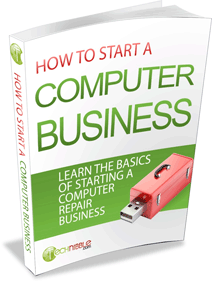- You are here:
- Home »
- Blog »
- MSP Management »
- 3 Essential Types of Insurance for your Computer Repair Business

3 Essential Types of Insurance for your Computer Repair Business
“You broke it, you pay for it. Or I’m gonna sue!”
It’s one of those days where you are struggling to focus and you accidentally break a customer’s favorite ornamental vase while doing an onsite repair. Or perhaps a customer trips over a power cord and gets injured while in your shop. What if an employee gets mysteriously zapped from a power outlet? You do your best to observe safety procedures, but can you be 100% free from risk?
We know from experience that despite our best efforts, accidents do happen. While accidents are unpleasant and unexpected, there are two ways you can prepare for it. One is for you to save up for it and pray it will never happen. Or you can have the risk covered by insurance.
But which type of insurance is the most important?
General Liability Insurance
Working on your client’s computer puts you into contact with many things, and raises the risk that you might break something. The resulting cost of compensation and potential legal fees can be crippling to your business.
A General Liability Insurance policy can protect your business from claims of bodily injury, associated medical costs, property damage, and even slander – whether from residential or business users. It typically has coverage for the following:
Bodily injury. For instance, your customer slips and falls in your shop or you cause an accident in your customer’s premises and they sustain an injury. This should be covered if you’re legally liable for this incident.
Damage to property. Either you or your employee accidentally damages your customer’s property, and you’re legally liable for this then your General Liability Insurance will cover the costs for the damage incurred.
Personal injury. When your client sues you for defamation, libel, or slander, for which you are legally liable.
Medical expenses. Any associated medical expenses for bodily injury to which you are legally liable.
Of course, there is more coverage than this and this insurance has exclusions too. But if you are aiming to sign up small business clients, then getting a General Liability Insurance is a good risk management strategy. It will show your clients that you are legit, and you seriously take measures to protect your business.
Business Owner Policy
Some insurers only sell BOP Insurance to small, low-risk businesses. And that means you can likely get lower premiums. This type of insurance bundles two policies together, the General Liability Insurance and Commercial Property Insurance. It’s one way to get business insurance for less.
Your Commercial Property Insurance can reimburse you for destroyed or damaged property. And this is not only about your electronic devices. It includes office furniture, equipment, supplies, buildings, and nearly everything that your business owns or rents. It even covers acts of vandalism on your business.
It can protect you from property damage such as fire, accidental damage, and theft. For a qualified claim – fire, hail, windstorm, theft, and vandalism – your insurance can pay to replace your damaged property. In the event that you have to shut down for weeks to clean up and repair, a Business Interruption Insurance claim can recoup your lost income while your business is on hold.
This bundled policy is more practical than getting them individually. It gives more coverage for your business risks but for a lesser price.
Error and Omission
Errors and Omissions Insurance is one of the most popular policies for MSPs aside from General Liability Insurance. It helps cover lawsuits when a client sues you over a mistake or a missed deadline, or an oversight that caused them a financial loss.
We all try not to make mistakes but they do happen. And in some cases you don’t even need to make a mistake to get sued anyway. When your clients lose sales because of a technology issue, they may try to recover any way they can. One option is to sue whoever is behind the technology, like you.
Your Error and Omission Insurance can help pay for:
- Lawyers to represent you in court proceedings.
- Financial damages, if you’re found liable in court.
- An out-of-court settlement to resolve the lawsuit.
- Other lawsuit-related expenses.
One advantage of this insurance is that your clients get assured that if outages and mistakes cost them money, they’ll be able to sue and recoup their losses if you are liable. If you are handling medium business clients, then this policy is a practical way to cover your work-related risks.
Yes, no one wants to have accidents happen while doing business. But the risk is there, and the only practical step you can do is to prepare for it. By investing money in these insurance policies, you give confidence to your clients that you have a safety net when things go wrong. You also have a good plan to save your business when it falls into dire straits – a minimal premium but with a lump sum benefit.

GET THE FREE GUIDE
Learn the Basics of Starting a Computer Repair Business!
In this guide you can find out everything from the essential skills you need to start a computer repair business, how to get set up, set your pricing and avoid common beginner mistakes.
Session expired
Please log in again. The login page will open in a new tab. After logging in you can close it and return to this page.

I’d say it’s not common but it happens, and it only takes one bad time to ruin your whole year. If you’re doing data recovery it may be more likely – equipment can be replaced, but “he destroyed the only copy of my Great American Novel that was going to make me rich!” is harder.
There’s also the factor of “anyone can sue for anything,” and even if a suit is baseless you still have to deal with it. With insurance, you may be able in some cases to open a claim with the insurance company and have them dealing with the problem person.
I have been doing this for over a decade now, never been sued and don’t know anyone that have been sued, but you have to protect yourself. It is really good idea to have General Liability Insurance